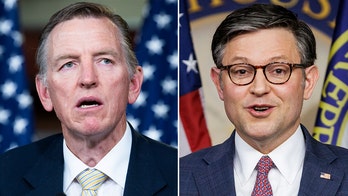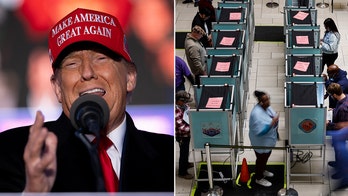Trump's budget: Where are the spending cuts?
Rep. Marsha Blackburn, (R-Tenn.), on President Trump's 2019 budget and infrastructure plan.
President Trump unveils his budget proposal today.
Lawmakers and media will exhaust an inordinate amount of time fileting Trump’s annual fiscal entreaty.
But ironically, the budget won’t amount to anything. It would be more fruitful to parse the rhetorical meaning of the expression “Dilly Dilly” in Budweiser commercials.
Here’s why:
Federal budgets don’t count for much. They’re just a criterion of how an executive, in a perfect world, would spend federal dollars.
Budgets are aspirational. They outline what’s important and not so important to an administration. Contrast the budget blueprints of Presidents Trump, Barack Obama and George W. Bush. There’s great polarity among programs one president holds dear and initiatives another president would kick to the curb.
Congress rarely actually votes on a president’s budget. The House and Senate are supposed to draw up their own archetypes for federal spending each year. But the need for that budgetary etude went by the wayside when Rep. Doug Collins, R-Ga., slammed down the gavel at 5:32 a.m. ET Friday, as the House approved the “Bipartisan Budget Act of 2018.” The package sets federal spending parameters for two years. In other words, a fiscal profile. But a budget does not assign federal spending. That comes via appropriations. Appropriations are how lawmakers determine specifically how much they’ll allocate to every federal program.
In Congress, budgets are blanks. Appropriations are live ammo.
“The budget does bend the trajectory down. It does move us down toward balance. It does get us away from trillion-dollar deficits,” said White House Budget Director Mick Mulvaney on “Fox News Sunday.”
The White House says the budget plan executes “an aggressive set of spending reforms” designed to slash the deficit by $3 trillion over 10 years.
And yet Friday, Congress approved a budgetary plan which incinerated spending caps harnessing military spending and simultaneously carbonized spending caps for all other domestic spending areas.
This brings us to Sen. Rand Paul, R-Ky.
The Kentucky Republican singlehandedly forced a government shutdown for a few hours Friday morning simply because he thought Congress – and specifically Republicans – abandoned any speck of fiscal responsibility with the budget measure.
“I’m here to put people on the spot and make them uncomfortable,” said Paul as he singularly hijacked a Senate plan to vote on the budget package Thursday afternoon. “We have a 700-page bill that was printed at midnight and no one has read it.”
Paul verbally tussled with his colleagues in a series of feisty floor speeches Thursday night. Precious minutes bled off the clock, hurtling the government toward a midnight shutdown. Paul held particular enmity for Republican colleagues masquerading as fiscal conservatives.
“Remember when Obama was 'spending us into oblivion?'” asked Paul. “How come you were against Obama and now for Republican deficits? Isn’t that the very definition of hypocrisy?”
Paul castigated fellow GOPers the way Tara Lipinski and Johnny Weir chide Olympic figure skaters.
Senate rules afford the minority significant power. Not just the minority party, such as Democrats. But a minority of senators. Or in this case, a minority of one: Rand Paul. It appeared that nearly all senators favored speeding up the process Thursday on the budget.
But Paul blocked them all. A minority of one. And that’s why the government briefly shuttered after midnight.
“I see why he doesn’t get along with his neighbors,” fumed one senior Republican senator who asked not to be identified.
But consider Paul’s grievance.
The budget package suspends the federal debt limit until March 2019, the total amount of red ink the government can carry at any one time. Congress faced a crisis in 2011 over lifting the debt ceiling. In 2010, the Tea Party reached its zenith, complaining about President Obama and congressional Democrats. Republicans seized the House, promising to slash spending on the heels of a $700 billion fiscal rescue package, a $700 billion economic stimulus plan and the enactment of ObamaCare.
Budget hawks finally extracted a concession. In exchange for lifting the debt limit, Congress would impose sequestration spending caps across the board. Those caps would strangle federal spending to the tune of $1.2 trillion over a decade.
Consider the horse-trading in 2018.
In exchange for suspending the debt ceiling, Congress repealed the same spending caps implemented in 2011.
In other words, lawmakers completely contradicted themselves.
Times change. The Tea Party is rarely heard from these days. To hear Rand Paul tell it, Washington worries about deficits the way casual sports fans care about mixed doubles curling in Pyeongchang.
Around 8:24 p.m. Thursday, Sen. Thom Tillis, R-N.C., came to the floor to criticize Paul’s government shutdown gambit over deficit spending.
“We can play this game until 1 a.m.,” said Tillis, noting Paul could only delay a procedural vote on the package until an hour after midnight on Friday, 60 minutes into a shutdown.
“Do you want to be a senator that wants to make a point or do you want to make a difference?” asked Tillis of Paul in an unusually personal debate. “There’s not a whole lot of history books about the ‘Great Points’ of the American Senate. There are history books about the great results of the American Senate. The great bills like the tax reform bill. The other things that we’ve done in this session. But not points. People aren’t here to talk about a ‘good point.’ They’re here to talk about a good outcome.”
And so the government shut down, only to re-open after the Senate approved the bill in the dead of night and the House synced up with the Senate just before dawn.
Dismiss the deficit if you want. But Paul’s point was made.
Capitol Attitude is a weekly column written by members of the Fox News Capitol Hill team. Their articles take you inside the halls of Congress, and cover the spectrum of policy issues being introduced, debated and voted on there.






